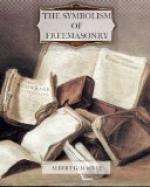Temple building was the original occupation of our ancient brethren. Leaving out of view that system of ethics and of religious philosophy, that search after truth, those doctrines of the unity of God and the immortality of the soul, which alike distinguish the ancient Mysteries and the masonic institution, and which both must have derived from a common origin,—most probably from some priesthood of the olden time,—let our attention be exclusively directed, for the present, to that period, so familiar to every Mason, when, under the supposed Grand Mastership of King Solomon, Freemasonry first assumed “a local habitation and a name” in the holy city of Jerusalem. There the labor of the Israelites and the skill of the Tyrians were occupied in the construction of that noble temple whose splendor and magnificence of decoration made it one of the wonders of the world.
Here, then, we see the two united nations directing their attention, with surprising harmony, to the task of temple building. The Tyrian workmen, coming immediately from the bosom of the mystical society of Dionysian artificers, whose sole employment was the erection of sacred edifices throughout all Asia Minor, indoctrinated the Jews with a part of their architectural skill, and bestowed upon them also a knowledge of those sacred Mysteries which they had practised at Tyre, and from which the present interior form of Freemasonry is said to be derived.
Now, if there be any so incredulous as to refuse their assent to the universally received masonic tradition on this subject, if there be any who would deny all connection of King Solomon with the origin of Freemasonry, except it be in a mythical or symbolical sense, such incredulity will, not at all affect the chain of argument which I am disposed to use. For it will not be denied that the corporations of builders in the middle ages, those men who were known as “Travelling Freemasons,” were substantial and corporeal, and that the cathedrals, abbeys, and palaces, whose ruins are still objects of admiration to all observers, bear conclusive testimony that their existence was nothing like a myth, and that their labors were not apocryphal. But these Travelling Freemasons, whether led into the error, if error it be, by a mistaken reading of history, or by a superstitious reverence for tradition, always esteemed King Solomon as the founder of their Order. So that the first absolutely historical details that we have of the masonic institution, connect it with the idea of a temple. And it is only for this idea that I contend, for it proves that the first Freemasons of whom we have authentic record, whether they were at Jerusalem or in Europe, and whether they flourished a thousand years before or a thousand years after the birth of Christ, always supposed that temple building was the peculiar specialty of their craft, and that their labor was to be the erection of temples in ancient times, and cathedrals and churches in the Christian age.




